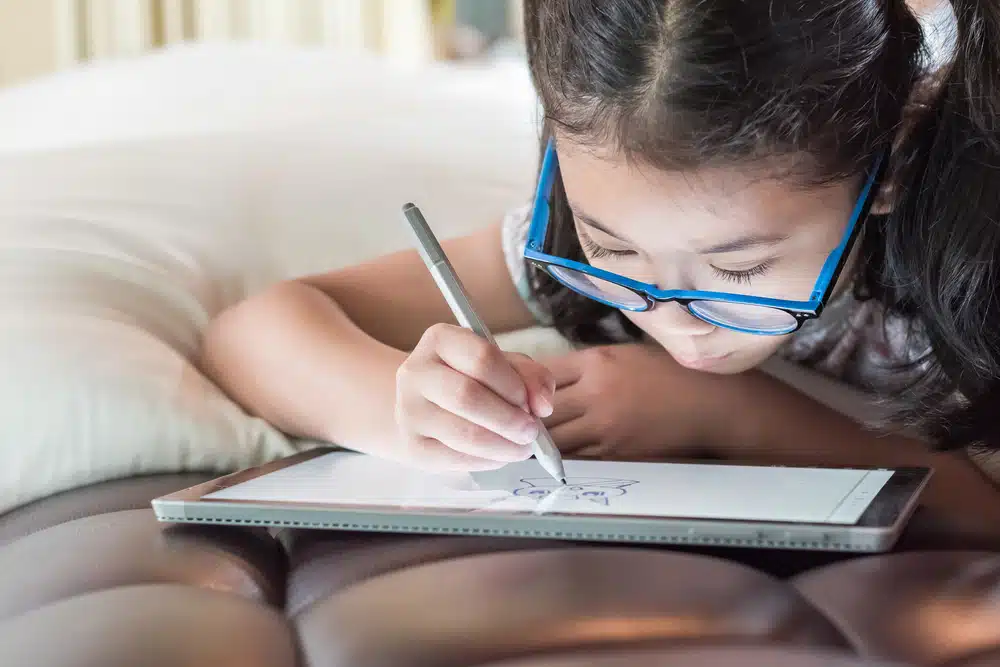As children undergo development, a lot can change during those years. And that includes their vision. That’s why staying on top of their vision development is imperative. Any vision loss or impairment can drastically impact their studies and overall confidence if left unnoticed. Having their eyes regularly checked is the best way to stay informed if there is an issue.
You can also try to make assessments yourself by looking out for some of these signs:
Contents
Take Note of Any Unusual Behaviour
Often, one of the first signs that may point to an issue with your child’s vision is if they begin to act out of the ordinary. For example, if you notice them squinting, rubbing their eyes or even blinking excessively, it could point to a vision problem. Also, if you notice any physical signs around the eyes, such as drooping eyes or excessive tearing, you should have their eyes assessed by an optometrist.
Excessive headaches or Dizziness
If your child begins to develop frequent headaches or dizziness, especially during or after reading something, this is a very common sign that their vision could be the cause. Something simple like eyeglasses can help rectify this.
Reading Close Up
Even if your child doesn’t seem to display any previous symptoms, such as headaches, another common sign to watch out for is if they hold a book very closely to their eyes in order to read it. Conversely, if they hold a book very far from their face, this too could show that there might be vision problems occurring.
Ask You Child
One of the best ways to really get a grasp on your child’s vision is by asking them. You can ask whether they feel like they can see the blackboard from their desk properly, or if they’re having any problems focusing on any of the written material. Vision problems are common, but children can often feel ashamed or embarrassed about experiencing them. So it’s important to have a conversation with them to reassure them that if they are feeling out of focus with anything, it’s okay to tell you.
Determining whether your child has vision problems usually isn’t too difficult to spot. There are generally some signs that will signal a red flag and tell you that they are struggling with their sight. So keep an eye out for each of these potential signs. And if you notice any of these signs, set up an appointment with their eye doctor for an assessment so they can help your child get back to seeing with confidence.
As children undergo development, a lot can change during those years. And that includes their vision. That’s why staying on top of their vision development is imperative. Any vision loss or impairment can drastically impact their studies and overall confidence if left unnoticed. Having their eyes regularly checked is the best way to stay informed if there is an issue.
You can also try to make assessments yourself by looking out for some of these signs:
Take Note of Any Unusual Behaviour
Often, one of the first signs that may point to an issue with your child’s vision is if they begin to act out of the ordinary. For example, if you notice them squinting, rubbing their eyes or even blinking excessively, it could point to a vision problem. Also, if you notice any physical signs around the eyes, such as drooping eyes or excessive tearing, you should have their eyes assessed by an optometrist.
Excessive headaches or Dizziness
If your child begins to develop frequent headaches or dizziness, especially during or after reading something, this is a very common sign that their vision could be the cause. Something simple like eyeglasses can help rectify this.
Reading Close Up
Even if your child doesn’t seem to display any previous symptoms, such as headaches, another common sign to watch out for is if they hold a book very closely to their eyes in order to read it. Conversely, if they hold a book very far from their face, this too could show that there might be vision problems occurring.
Ask You Child
One of the best ways to really get a grasp on your child’s vision is by asking them. You can ask whether they feel like they can see the blackboard from their desk properly, or if they’re having any problems focusing on any of the written material. Vision problems are common, but children can often feel ashamed or embarrassed about experiencing them. So it’s important to have a conversation with them to reassure them that if they are feeling out of focus with anything, it’s okay to tell you.
Determining whether your child has vision problems usually isn’t too difficult to spot. There are generally some signs that will signal a red flag and tell you that they are struggling with their sight. So keep an eye out for each of these potential signs. And if you notice any of these signs, set up an appointment with their eye doctor for an assessment so they can help your child get back to seeing with confidence.
